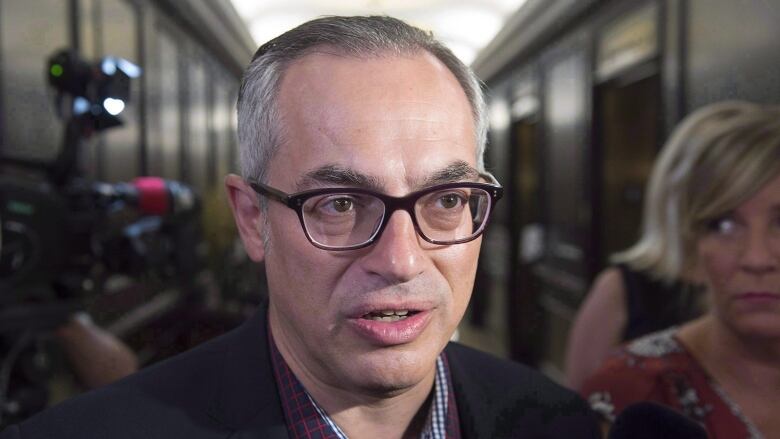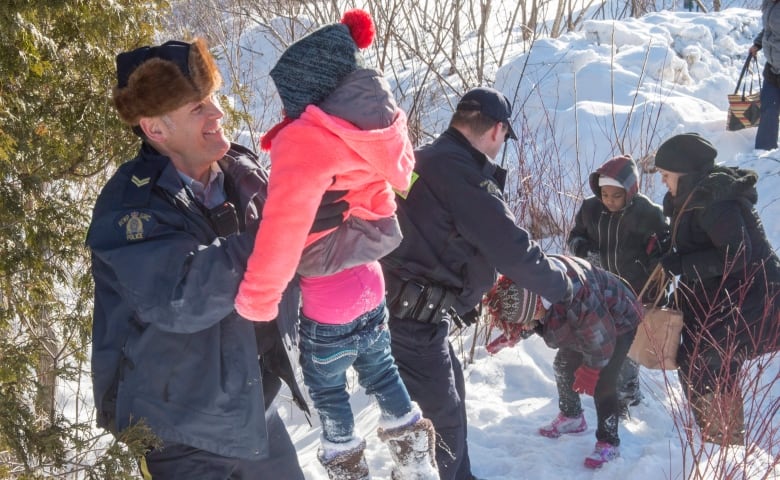Tony Clement hangs up on CBC Daybreak after exchange over asylum seekers
Public safety critic takes issue with questions about RCMP posed by morning host

Tony Clement, the Conservative Party's public safety critic, hung up on CBC Montreal Daybreak host Mike Finnertythis morning after hegrew frustrated with Finnerty'sline of questioning on asylum seekers crossing the U.S. border into Canada.
Clement said he wants the Trudeau government to do more to stop the flow of people escaping the U.S. and trying to enter Canada.
But the exchange in the phone interview Tuesday grew more heated as Finnertypressed Clement on what exactly he wants to see done.
Listen to thefull interview or read the transcript below.
After hanging up, Clementtook to Twitter to criticize CBC for the interview.
Way to go CBC. Taking a serious issue (illegal crossings) to shout me down on the air. Your tax dollars at work.
—@TonyclementCPCQuebec has seen a spikein the number of asylum seekerscrossing into the country from the U.S.
In January, 452 people claimed asylum at Quebec border crossings a 230 per cent increase from January 2016, the RCMP said.
Entering Canada is a way to avoid the Canada-U.S.Safe Third Country Agreement.
The 2004 pactrestricts refugee claims from people enteringCanada via its official land borders with the U.S. to only those with family in Canada and unaccompanied minors, among a few other exceptions.

The transcript, edited for clarity and brevity,follows.
MF: What exactly are your concerns with the increase in asylum seekers crossing the border on foot?
TC: First of all, let's say the obvious, which is Canada is a welcoming and compassionate country and we accept tens of thousands of refugees every year. What's happening in Quebec and Manitoba is that these claimants are crossing on foot, not at points of entry, and so that makes it an illegal crossing, and then of course the resources of both the communities and the RCMP are strained to deal with these individuals. We want everybody to be safe. It's not safe to cross the border outside of a point of entry for these claimants, and we also want our laws to be applied. The laws are very clear that these would be an illegal crossing so we would like to see fewer of these than are happening right now.
MF: Is there asecurity risk to Canadians?
TC: We don't know yet. What happens with illegal crossings is you can only vet once they are in the country. I don't have any information one way or the other as to whether these are people who are a threat to our society. The better way to deal with this is to obviously claim refugee status and that is something that many, many people do every year. We've got a queue jumping situation here as well where we are diverting resources with these claims rather than the people who are going through the legal process.
MF: One immigration lawyer told us the new system was put into place under the Conservative government in 2012. Before that, he says, we didn't have these kinds of problems. Do you accept that those changes in rules haveled to refugee claimants risking their safety, crossing the border when they're not supposed to?
TC: Actually, this goes back to the Chrtien years, when the Third Safe Country Agreement was first initiated with the United States, which talked about what would happen when a refugee claimant from the United States went across the border at a point of entry. Obviously, there's a gap, because these people are not coming across at a point of entry. So, I don't think this is very acceptable to start laying blame on the Harper government or the Chrtiengovernment. We have a problem, and let's make sure that people are crossing our border legally rather than illegally.
MF: Do you think the government should change the rules and make it clear that refugee claimants are welcome to come to the land border crossing where it will be safer and in an orderly fashion?
TC: I think we need to make sure refugee claimants are abiding by Canadian law and that the RCMP have the resources necessary both at border crossings and in between crossings to make sure that we don't get illegal claimants, because that's a huge strain on the system, it promotes illegal activity and unsafe and dangerous activity for the claimants themselves. So, yes, we are calling on the government to put in more resources at the border ...
MF: But the question was about changing that rule that would then allow these claimants to cross in the normal way on a road or a bus or train instead of having to cross on foot. Because the government could do that and it would fix that part of the problem.
TC: But that's the law right now. Yes, we want the law to be applied.
MF: So you think you should keep that rule in place, meaning that people still will try their luck and cross on foot.
TC: I'm saying that the RCMP need more resources to prevent that kind of activity and that we should be applying the law as it exists right now.
MF: So what should they do?
TC: As a first stop, sir, we should apply the law. How about that for a reason?
MF: Because we have photographs, for instance, on the front page of the newspapers this morning here in Quebec of RCMP officers welcoming refugees on foot. In fact, there's a picture on two of the papers of a baby being handed over into the arms of ...
TC: Yeah, we're a welcoming society. I get that. But ...
MF: But are you saying they should act differently?
TC: No, now you're putting words in my mouth.
MF: I'm just asking you, actually. What do you think the RCMP's role should be on the border?
TC: I've already told you. I've already told you, sir. We should apply the law. We should make sure the RCMP have the resources to apply the law.
MF: Right, so what would that look like?
TC: ...and we are a law-based society and any claimants who want to make a claim to Canada should do so through legal means. And I believe that your listeners believe that and I believe that Canadians believe that. And we're calling on the government ...
MF: Fine. But, so what would that look like?
TC: Sorry, I'm interrupting you. Sorry, what did you want to say?
MF: The RCMP are there on the border. What would you like them to do differently?
TC: I would like the government to come up with a plan to apply the law. Now if you're asking for the specifics ...
MF: My question is what would that mean? I'm just curious to know what happens to those people who are crossing foot when they meet the police?
TC: I'm not the government. The CBC is not the government. It's up to the government to come up with a plan.
MF: But with respect, you're the Official Opposition and you're supposed to be coming up with solutions as well as just criticizing.
TC: Come up with a plan. Come up with a plan. That's ...
MF: So you don't have any idea how it should work.
TC: Sir, now you're putting words in my mouth.
MF: Well then tell us how it would work. It's a simple question.
TC: We have a problem. It's simple. Apply the law.
MF: But how would they apply the law?Would they stop them, would they say 'I'm sorry you can't cross here and you should go back across the border?'How would ...
[DIAL TONE]












_(720p).jpg)


 OFFICIAL HD MUSIC VIDEO.jpg)
.jpg)



























































































